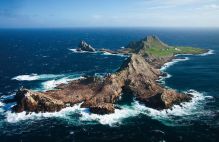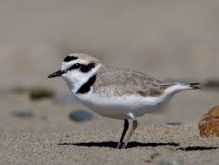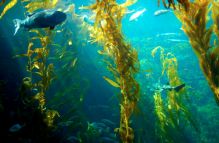North-central California Coast and Ocean Climate-Smart Adaptation Working Group Meetings



December 3, 2015 • Oakland, CA • Elihu M. Harris State Building, Conference Room 11
Overview
The goal of the North-central California Coast and Ocean Climate-Smart Adaptation Project is to collaboratively develop and implement adaptation actions in response to, and in preparation for, climate change impacts on habitats, species and ecosystem services (termed focal resources). Vulnerability to climate and non-climate stressors was assessed for select focal resources in the region during Phase 1 of the project through two decision-support workshops. Climate-smart adaptive management actions will be developed and prioritized by the Climate-Smart Adaptation Working Group in Phase 2 of the project.
The goal of the Climate-Smart Adaptation Working Group is to develop and prioritize climate-smart adaptive management recommendations that can be feasibly implemented by managers to reduce the vulnerability of focal resources, while considering a range of plausible future climate scenarios for the region.
Agenda & Speakers
----------
Working Group Schedule:
- December 3, 2015: Working Group Meeting in Oakland, CA
- February 2016: Presentation of Working Group recommendations to the Sanctuary Advisory Council
Reading & Resources
Resources
- UPDATED Habitat Adaptation Recommendations
- Habitat Management Goals
- Habitat Vulnerability Assessments (read only the assessment for your habitat): beaches/dunes, coastal cliffs, rocky intertidal, estuaries
- Habitat Impacts (under various scenarios)
- Example Coastal and Marine Adaptation Strategies and Actions Table
- Gulf of the Farallones National Marine Sanctuary Management Plan
Adaptation Planning Maps
Supplemental Reading
- California Coastal Commission. 2015. California Coastal Commission Sea Level Rise Policy Guidance: Interpretive Guidelines for Addressing Sea Level Rise in Local Coastal Programs and Coastal Development Permits. 293 pages. Recommended reading: Chapter 7, Section C
- Restore America's Estuaries. 2015. Living Shorelines: From Barriers to Opportunities. Arlington, VA. 54 pages. Recommended reading: Entire document
- Stein, B.A., P. Glick, N. Edelson, and A. Staudt (eds.). 2014. Climate-Smart Conservation: Putting Principles into Practice. National Wildlife Federation, Washington, D.C. 262 pages. Recommended reading: Chapter 8
- Marin Community Foundation. 2015. Climate Policies and Programs at the Federal, State, and Regional Levels: Context and Opportunities for Local Action. 36 pages. Recommended reading: Entire document
- Prahler, E. and Mooney, S. Application of Land Use Practices and Tools to Prepare for and Adapt to Climate Change. Preparing for the Future: Climate Change and the Monterey Bay Shoreline. Center for Ocean Solutions. 27 pages. Recommended reading: Entire document
- Estuaries group only! Baye, P.R. 2014. Bolinas Lagoon Restoration Project: Design Review Group Meeting Summary and Synthesis. 8 pages. Recommended reading: Entire document
- Florida Reef Resilience Program. 2009. Climate Change Action Plan for the Florida Reef System 2010-2015. 17 pages. Recommended reading: Entire document
----------
Past Working Group Meeting Materials
October 16, 2015
September 15, 2015
May 27, 2015 (Oakland, CA)
- Adaptation 101 (with voice recording)
- Planning Group and Recommendation Organization
- Meeting notes
- Meeting products:
April 22, 2015 (Oakland, CA)
----------
GFNMS Vulnerability Assessment Results
Adaptation Planning Resources
- Many resources (case studies, tools, literary resources) are available through the Climate Adaptation Knowledge Exchange
Monitoring and Evaluation Resources
- Duncan, B.E., K.D. Higgason, T. H. Suchanek, J. Largier, J. Stachowicz, S . Allen, S. Bograd, R. Breen, H. Gellerman, T. Hill, J. Jahncke, R. Johnson, S. Lonhart, S. Morgan, J. Roletto, F. Wilkerson. 2013. Ocean Climate Indicators: A Monitoring Inventory and Plan for Tracking Climate Change in the North - central California Coast and Ocean Region. Report of a Working Group of the Gulf of the Farallones National Marine Sanctuary Advisory Council. 74 pp.
- EcoAdapt. Monitoring climate effects in temperate marine ecosystems. MPA Monitoring Enterprise, California Ocean Science Trust, Oakland, CA. February 2012.
Scenario Planning Resources
- Moore, S.S., N.E. Seavy, and M. Gerhart. 2013. Scenario Planning for Climate Change Adaptation: A Guidance for Resource Managers. Point Blue Conservation Science and California Coastal Conservancy.
- Rowland, E.R., Cross, M.S., Hartmann, H. 2014. Considering Multiple Futures: Scenario Planning to Address Uncertainty in Natural Resource Conservation. Washington, DC. U.S. Fish and Wildlife Service.
Other Resources
- Climate-Smart Adaptation for the North-central California Coast and Ocean Project Description
- Learn more about the history and evolution of the project by visiting the Focal Resources Workshop and Vulnerability Assessment Workshop support pages.http://ecoadapt.hostasaurus.com//data/documents/GFNMS_AdaptationWorkingGroupParticipants_updatedAug2015.pdf




